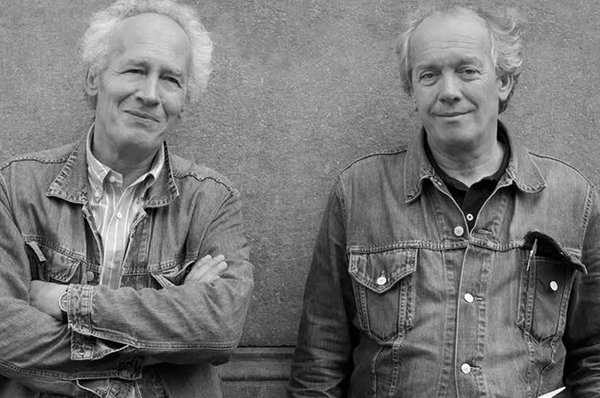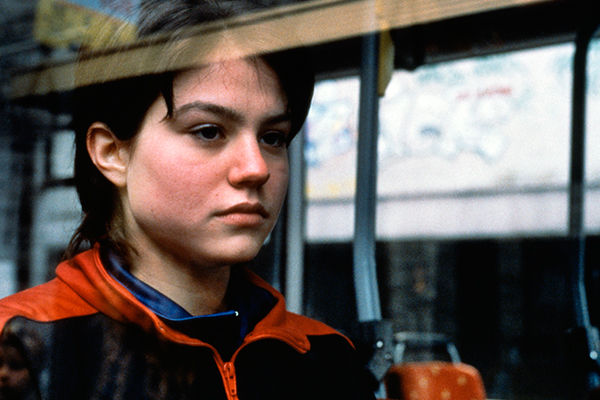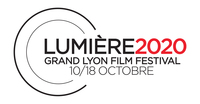Luc and Jean-Pierre Dardenne, The need for one another
PostED ON OCTOBER 7 AT 3:45PM
"My brother. I couldn't make this film without him and he couldn't make it without me", wrote Luc Dardenne in the 2000s. It is perhaps because they create works together that the Dardenne brothers feverishly produce films, which remind us all, as if it’s their motto, that we "need one another". The cinema of the Dardenne brothers at the Lumière festival could be the combination of Sunrise (F. W. Murnau, 1927) and The Man who Shot Liberty Valance (John Ford, 1962). In other words, miraculous, storybook sequences, mixed with Far West dilemmas and territory conflicts, where the social and political truth of man comes surging forward.

Copyright C. Plenus - Les Films du Fleuve - Archipel 35
First, there is a river, the Meuse. It traverses the city of the Dardennes, Liège, and regulates their stories on both sides. The banks offer the marginalized of The Child (2005), Lorna’s Silence (2008), or The Promise (1996), a bivouac. The protagonists, itinerant city cowboys, survive in the hollow of the natural elements, forming a reliable refuge for The Kid with a Bike (2011) hidden in the trees, or Young Ahmed (2019) roaming the fields. Rosetta (1999) and the son of The Promise bury objects in the soil made loose by perpetually humid weather.
In these urban westerns, that great outdoor genre, the inhospitable weather leads to tension and puts your nerves on edge. The cold humidity harasses Rosetta's back, or makes it harder for the young man from The Promise to race against the wind. The dry heat exacerbates the internal churning of the young Ahmed, crushes the unemployed woman of Two Days, One Night (2014), in perpetual circulation, pressured by an untenable social countdown in a city closing its doors, shutting her out. Hectic scooters, threatened marches, or anxious journeys by car or bicycle, are the daily lives of characters being hunted, socially cornered, between provocation, tension and pursuit.
A few rare moments of oblivion transfix those who, like Rosetta, do not want to "fall into the hole". A cousin of the unreserved dance scenes of Ford's westerns, recreation for the Dardennes is simple and unsophisticated, set to a popular tune, like the karaoke scene between the young hero of The Promise and his tyrannical and murderous father, singing together the unthreatening, indeed, carefree lyrics to Joe Dassin’s Whistling on the Hill. This ability to move from intense drama to lightness is all the more natural when it is instigated by youth. When we ask the question of the recurring theme of youth which dominates their filmography, the two brothers answer that young people do not yet know who they are and are not yet aware of their "need for one another". They are pioneers; their only asset is their physical energy and their hopes. Everything remains to be done. They have everything to learn.

Copyright Les Films du Fleuve / DR
Learning, a lesson in social and political solidarity, often involves manual and modest work. It educates The Son (2002), innervates Rosetta, Two Days, One Night, or The Unknown Girl (2016). A profession comes out of hiding, indicating a social status. For this purpose, the Dardennes’ characters fight physically, betraying those who love them, like the husband of Sunrise, who betrays his wife by wanting to assassinate her. In survival mode, they become obsessive to the point of ambiguity; they are John Wayne in The Searchers, they commit insane acts. Rosetta steals the work of the boy who helps her. The young father of The Child sells his baby. Ahmed attempts to kill a woman.
Faced with this relentless climb, the Dardennes then employ a surprise, shocking by its gentleness or its violence, which stops the trajectory dead in its tracks. It takes the form of a fall for the kid on the bike, and the young Ahmed. It will be the arm that helps Rosetta, in tears, get up (which reminds us of the husband who suddenly supports his failing wife by the waist in Sunrise). It's Lorna, who undresses to hold the boy who is in pain in front of her. These bursts of love are, according to an expression used by the Dardennes, "calls of life". The characters can then overcome their fear and proclaim a certain serenity, like the heroine at the end of The Wind, a fabulous western by Victor Sjöström (1928). Jean-Pierre and Luc Dardenne know how to end their stories, where even the most fragile protagonists instinctively understand that their hardships are not fatal.
Virginie Apiou
Jean-Pierre and Luc Dardenne, Lumière Award 2020
MASTER CLASS by Jean-Pierre and Luc Dardenne on Friday, October 16 at the Célestins, Theater of Lyon at 3 pm
LUMIÈRE AWARD CEREMONY honoring Jean-Pierre and Luc Dardenne on Friday, October 16 at Lyon Conference Center Amphitheater at 7:30 pm
They will also introduce
Two Days, One Night on Wednesday, October 14 at the IRIS / Francheville at 8:30 pm and on Thursday, October 15 at the Institut Lumière at 9 pm
The Promise on Thursday, October 15 at Pathé Bellecour at 10:45 am
I’m Thinking of You on Thursday, October 15 at the UGC Ciné Cité Confluence at 5pm
The Child on Sunday, October 18 at Pathé Bellecour at 2:30 pm
The Kid with a Bike on Sunday, October 18 at Lumière Terreaux at 5:15 pm

